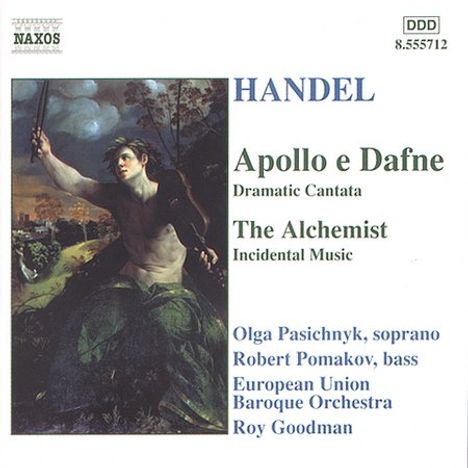Georg Friedrich Händel: Apollo & Daphne-Kantate HWV 122 auf CD
Apollo & Daphne-Kantate HWV 122
Herkömmliche CD, die mit allen CD-Playern und Computerlaufwerken, aber auch mit den meisten SACD- oder Multiplayern abspielbar ist.
(soweit verfügbar beim Lieferanten)
+The Alchemist (Suite aus Rinaldo, arrangiert von einem unbekannten Komponisten)
- Künstler:
- Olga Pasichnyk, Robert Pomakov, Eurpean Union Baroque Orchestra, Roy Goodman
- Label:
- Naxos
- Aufnahmejahr ca.:
- 2000
- Artikelnummer:
- 4086619
- UPC/EAN:
- 0747313571222
- Erscheinungstermin:
- 23.7.2001
In Apollo e Dafne, Händels ehrgeizigster Kantate, können wir ihn hören, wie er seine Begabung zur Oper verfeinert und seine sich entwickelnden dramatischen Fähigkeiten zu brillanter Wirkung bringt.
Apollo e Dafne wurde wahrscheinlich 1709 in Venedig begonnen, aber erst nach Händels Ankunft in Hannover 1710 vollendet, um seine Ernennung zum Kapellmeister des Kurfürsten aufzunehmen. Die Instrumentierung ist farbenreicher als üblich, und zusätzlich zu den üblichen Streichern fügte Händel eine Flöte, ein Oboenpaar und ein Fagott hinzu. Die musikalische Struktur ist relativ einfach, mit einer Abfolge von emotional abwechslungsreichen Da-Capo-Arien und einem Paar Duetten für die beiden Hauptpersonen Dafne, einen Sopran, und Apollo, einen Bass. Da Händels ursprüngliche Ouvertüre nicht erhalten geblieben ist, wird dieser Aufführung der Kopfsatz seines Konzerts Opus Opus 3, Nr. 1 vorangestellt, das wahrscheinlich zur gleichen Zeit komponiert wurde.
Wie Apollo e Dafne wurde auch die Musik zu Der Alchemist in Italien komponiert. Sie fand den Weg nach England auf unsicherem Wege und dank der unverschämten Frechheit eines Musikpiraten fast ein Jahr vor ihrem Komponisten. Bis auf einen Satz wurden alle Sätze ohne Genehmigung aus der ausgedehnten Ouvertüre zu Händels erster italienischer Oper Rodrigo entnommen, die 1707 in Florenz uraufgeführt wurde. Zurück in England drückte der unbekannte Arrangeur die Musik in den Dienst einer Wiederaufnahme von Ben Jonsons hundertjähriger Komödie Der Alchemist, die im Januar 1710 im Queen's Theatre auf dem Haymarket aufgeführt wurde.
Product Information
In Apollo e Dafne, Handel’s most ambitious cantata, we can hear him flexing his operatic muscles and honing his emerging dramatic skills to brilliant effect.
Apollo e Dafne was probably begun in Venice in 1709, but was not completed until after Handel’s arrival in Hanover in 1710, to take up his appointment as Kapellmeister to the Elector. The instrumentation is more colourful than usual, and in addition to the usual strings Handel added a flute, a pair of oboes and a bassoon. The musical structure is relatively simple, with a succession of emotionally varied da capo arias and a pair of duets for the two main characters, Dafne, a soprano, and Apollo, a bass. Since Handel’s original overture has not survived, this performance is prefaced by the opening movement of his Concerto Opus 3, No. 1, which was probably composed at the same time.
Like Apollo e Dafne, the music for The Alchemist was also composed in Italy. It found its way to England by an uncertain route, and nearly a year ahead of its composer, thanks to the bare-faced cheek of a musical pirate. All but one of the movements were taken without permission from the extended overture to Handel’s first Italian opera Rodrigo, first heard in Florence in 1707. Back in England the unknown arranger pressed the music into service in a revival of Ben Jonson’s hundred-year-old comedy The Alchemist, given at the Queen’s Theatre in the Haymarket in January 1710.
Rezensionen
A. Beaujean in stereoplay 12/01: "Händels Kantate "Apollo e Dafne", komponiert um 1710 in Rom, lässt bereits die musikalische Charakterisierungskunst des künftigen Opernmeisters erkennen: virtuoses Umspringen mit den verschiedensten Affekten, dankbare, einfallsreiche Aufgaben für die zeitgenössischen Sänger, farbige Instrumentation durch Anreicherung der Streicher mit Bläsern. Auf diese Weise wird die Kette von Rezitativen und Da-capo-Arien vor schematischer Einförmigkeit bewahrt."Disk 1 von 1 (CD)
-
1 Apollo E Dafne, Hwv 122: Overture
-
2 Apollo E Dafne, Hwv 122: Recitativo: La Terra E Liberata
-
3 Apollo E Dafne, Hwv 122: Aria: Pende Il Ben Dell'universo
-
4 Apollo E Dafne, Hwv 122: Recitativo: Ch'il Superbetto Amore
-
5 Apollo E Dafne, Hwv 122: Aria: Spezza L'arco E Getta L'armi
-
6 Apollo E Dafne, Hwv 122: Aria: Felicissima Quest'alma
-
7 Apollo E Dafne, Hwv 122: Recitativo: Che Voce! Che Belta
-
8 Apollo E Dafne, Hwv 122: Aria: Ardi, Adori, E Preghi In Vano
-
9 Apollo E Dafne, Hwv 122: Recitativo: Che Crudel!
-
10 Apollo E Dafne, Hwv 122: Duetto: Una Guerra Ho Dentro Il Seno
-
11 Apollo E Dafne, Hwv 122: Recitativo: Placati Al Fin, O Cara
-
12 Apollo E Dafne, Hwv 122: Aria: Come Rosa In Su La Spina
-
13 Apollo E Dafne, Hwv 122: Recitativo: Ah! Ch'un Dio Non Dovrebbe
-
14 Apollo E Dafne, Hwv 122: Aria: Come In Ciel Benigna Stella
-
15 Apollo E Dafne, Hwv 122: Recitativo: Odi La Mia Ragion!
-
16 Apollo E Dafne, Hwv 122: Duetto: Deh! Lascia Addolcire Quell'aspro Rigor
-
17 Apollo E Dafne, Hwv 122: Recitativo: Sempre T'adorero!
-
18 Apollo E Dafne, Hwv 122: Aria: Mie Piante Correte
-
19 Apollo E Dafne, Hwv 122: Recitativo: Dafne, Dove Sei Tu?
-
20 Apollo E Dafne, Hwv 122: Aria: Cara Pianta, Co'miei Pianti
-
21 The Alchemist, Hwv 43: Overture
-
22 The Alchemist, Hwv 43: Prelude (Anonymous Composer)
-
23 The Alchemist, Hwv 43: Menuet
-
24 The Alchemist, Hwv 43: Saraband
-
25 The Alchemist, Hwv 43: Bouree
-
26 The Alchemist, Hwv 43: Air
-
27 The Alchemist, Hwv 43: Menuet
-
28 The Alchemist, Hwv 43: Gavotte
-
29 The Alchemist, Hwv 43: Jigg
Mehr von Georg Friedrich...
-
Georg Friedrich HändelAcis und Galatea (1718)2 CDsVorheriger Preis EUR 24,99, reduziert um 0%Aktueller Preis: EUR 9,99
-
Georg Friedrich HändelConcerti grossi op.3 Nr.1-6CDVorheriger Preis EUR 17,99, reduziert um 0%Aktueller Preis: EUR 7,99
-
Georg Friedrich HändelCleofida, Königin von Indien (mit deutschen Rezitativen von Georg Philipp Telemann)3 CDsVorheriger Preis EUR 29,99, reduziert um 0%Aktueller Preis: EUR 14,99
-
Gloria Dresdensis - Orchesterwerke aus DresdenCDVorheriger Preis EUR 17,99, reduziert um 0%Aktueller Preis: EUR 7,99






